There are many signs to watch for with an expecting cow. Though this is my first dairy cow, this isn’t my first time around cows calving. In this video and blog post, I’ll share the signs to watch for with an expecting cow (and some specifics to watch for in dairy cows).
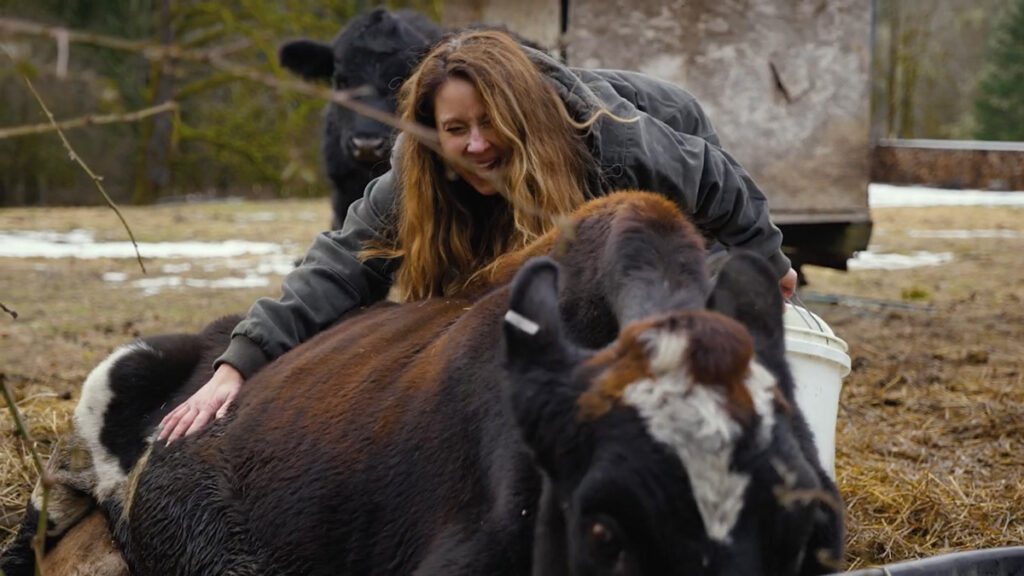
As many of you know, we took on Clover in 2022 because some friends of ours had taken her on as a favor for another family who had to move out of town.
At the time, we thought Clover was between 8-10 years old. Dairy cows, especially if they’ve given birth before and have done well, can continue birthing until they’re upwards of 20 years old.
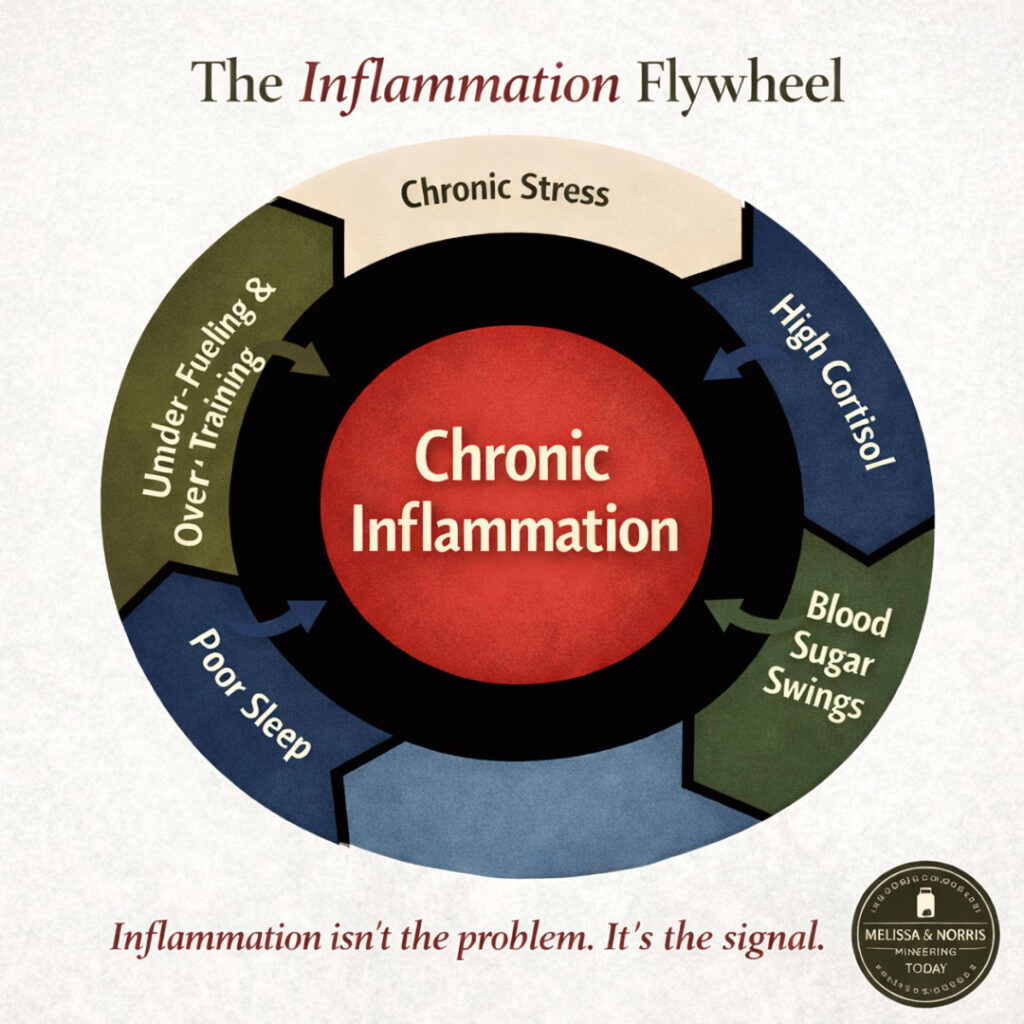
The Hidden Cycle Keeping You Inflamed
If you’ve been feeling puffy, tired, achy, or wired-but-tired, this two-page guide will help you understand what may be happening behind the scenes — even if you’re eating “healthy.”
Download the Inflammation Flywheel Guide and learn:
- Where to start so you don’t feel overwhelmed
- The 5 most common drivers that keep inflammation switched on
- Why blood sugar swings, stress, and poor sleep feed each other
As it turns out, we had a vet look at Clover’s teeth when she was laboring. He informed us that she was much older than we originally were told. Now, in hindsight, we would have never had Clover bred back if we knew how old she really was. However, this homesteading life doesn’t always come with 20/20 vision.
Table of Contents[Hide][Show]
Why You Should Monitor Your Cow
The picture above is of my beautiful dairy cow Clover. She is due soon, and in this photo the baby had just kicked my hand.
Toward the end of a cow’s pregnancy, it’s important to watch them closely every day and almost every hour once labor is imminent. This is to ensure they have all they need and to catch any dangers that might be looming.
Clover had a difficult pregnancy toward the end, and I’ll share more about this in an upcoming podcast. If you’re planning to breed your cows, or you already have an expectant cow, here are some signs and dangers to watch for when they are pregnant.
If you haven’t yet purchased a milk cow, be sure to check out this post on the eight things to know when keeping a family milk cow.
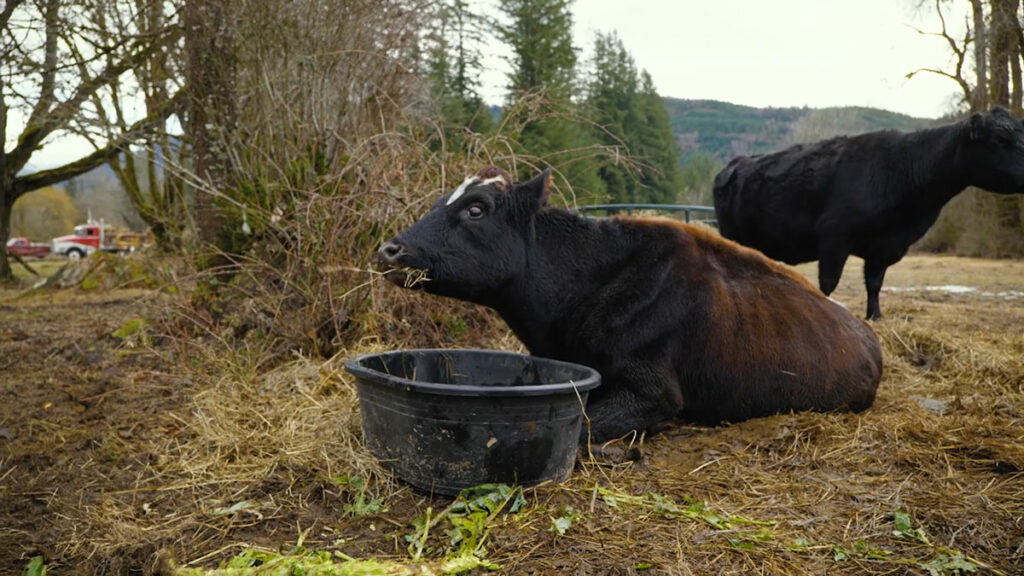
Signs Your Cow is Ready to Give Birth
As the cow’s due date nears, you’ll want to keep a closer watch on them. If their due date is imminent, it’s ideal to start checking your cow hourly to see how they are doing.
Here are some signs your cow is ready to give birth:
- The cow is passing mucus and showing signs of dilation.
- Your cow is laying down for more extended periods.
- The cow has a harder time getting up from laying down.
- Udder development, or sometimes even milk dripping from the teats.
- Once labor begins you may also hear more vocalization from the cow.
- Restlessness, sniffing the ground and licking the hind area.
- Raised tail and softened and swollen vulva.
Be sure your cow has access to plenty of feed and water at all times. And, if you’re a softy like me, you can spoil them with some goodies from the garden.
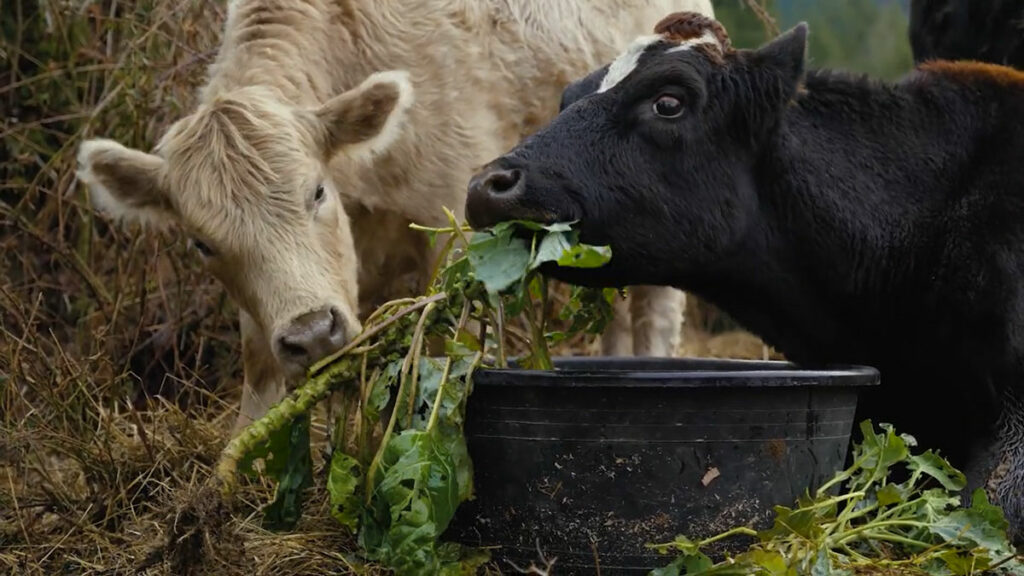
Subscribe to Melissa K. Norris!
Get updates on the latest posts and more from Melissa K. Norris straight to your inbox.
We use your personal data for interest-based advertising, as outlined in our Privacy Notice.
Dangers Expecting Cows Face
Cows can face multiple dangers during pregnancy. It’s important we’re well aware of what to watch for to help keep both the cow and calf safe. If you watch them closely, keep their needs met, and have a great veterinarian on call, you can minimize these dangers quite a bit.
Pinched Nerves
If your cow is laying down for long periods of time or seems to be unable to get up, this could be a sign that the cow has a pinched nerve.
A cow laying down with their front legs propped under them may not be a cause for concern. However, a cow laying down prone needs attention.
As with most mammals in their final days of pregnancy, it could just be that your cow is tired and needs more of a rest. Because of this they may lay down more often than usual. If you suspect a problem, such as nerve issues, you can attempt to help the cow move to a better position and relieve this issue by using a hip clamp.
A hip clamp attaches to the hindquarters of the cow. You can use a tractor to help hoist them up to their feet.
What is Milk Fever
Milk fever is something only dairy cows are prone to, but it can be life-threatening if not caught immediately.
Milk fever happens when the cow’s body creates milk so fast that it depletes calcium in its system. It’s usually a danger seen right after birth. However, sometimes it occurs earlier. Cold ears and nose could be a sign of milk fever, which is a metabolic issue.
Each time you check on your cow, give a cursory check of its ears and nose. If they are warm, this is a good sign; if they are cold, this signifies a potential problem.
Also, watch the cow’s front legs as they’re standing. If they look wobbly at all, this can also be a sign of milk fever. Or, if your cow is putting its head against the wall of a stall, or a post or tree, this can also indicate weakness in the front legs.
You can supplement with calcium if you suspect milk fever, but do keep in mind that you’ll also need to supplement with magnesium so their body can absorb the calcium. It usually takes an hour or so for the supplements to take effect. If you’re unsure of how much to give, this is a good time to get a vet involved.
Typically speaking, the older the cow and the more milk they produce, the more at risk they are for milk fever.
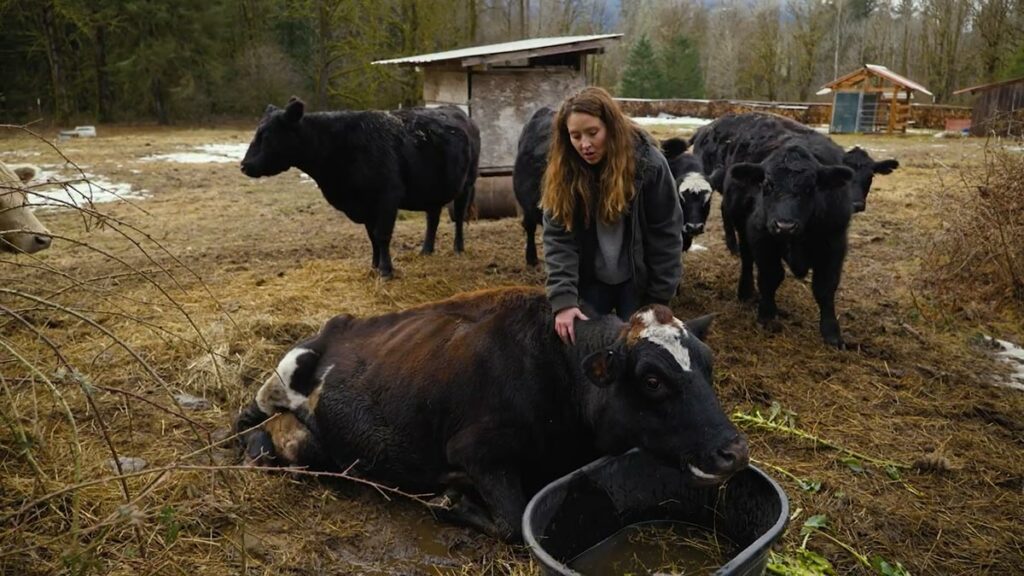
Preventing Milk Fever
Once a dairy cow has given birth (or at the first signs of labor), you will administer calcium and magnesium to them through either an oral drenching (which is a solution that you squirt down their throat, or a bolus (which is in paste form that the cow swallows, very similar to worming a horse).
You’ll then administer this again 12 hours later.
In our experience with Clover, we weren’t sure if she was experiencing milk fever, so we treated her preventatively with calcium and magnesium because this treatment won’t hurt them, even if they were not experiencing milk fever.
Compartment Syndrome
If your cow is laying down for large portions of time (more than 12 to 18 hours), this may be cause for concern. When cows are down for too long, parts of their body start falling asleep.
This is called Compartment Syndrome. It occurs when the pressure reduces the blood flow to an unhealthy level needed to sustain tissue or cuts it off altogether.
If you suspect your cow is in danger of compartment syndrome, it’s important to get them up and moving as soon as possible. Using a hip clamp or calling the vet may be your best option.
Ketosis
Though it’s not very common, one thing that can happen to cows is after delivery, they can actually go into Ketosis. This isn’t something that’s common with grass-fed cows, but it may be a good idea to have a blood ketosis test on hand.
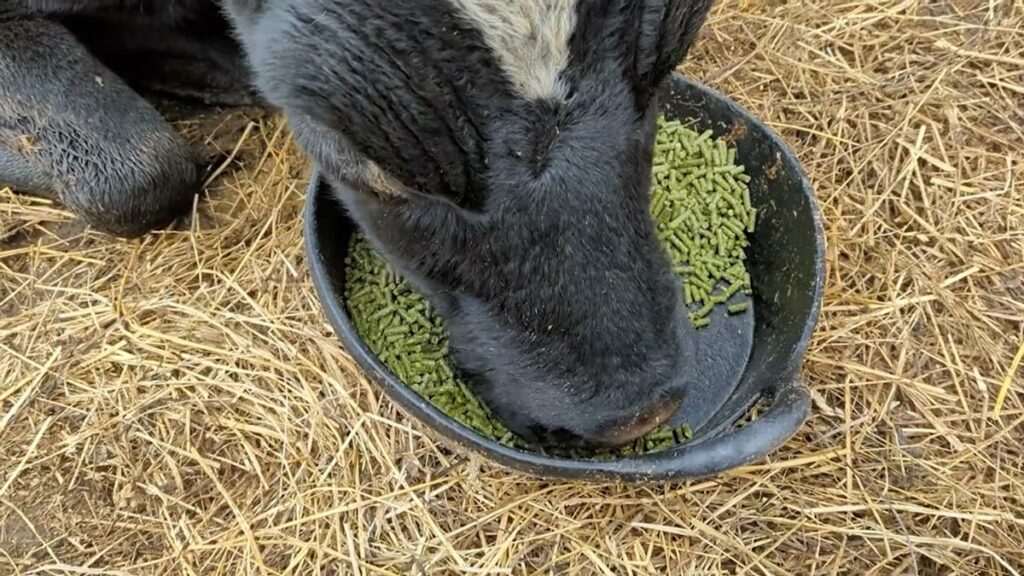
Azure Standard
Since we’re talking about meeting your cow’s needs during pregnancy, labor and post-delivery, Azure Standard, the sponsor of this video, offers many animal products in addition to their food and pantry products.
I use their organic alfalfa pellets because Clover loves them. But it also helps meet her nutritional needs while pregnant.
Since these pellets are certified organic, this means they are also non-GMO. I like to use this product instead of buying bales of alfalfa from the feed store because, when buying those bales, I am not sure they are non-GMO.
Right now, Azure Standard is offering you a great discount (for first-time customers only) of 10% off your first order of $50 or more with coupon code “Pioneering10”.
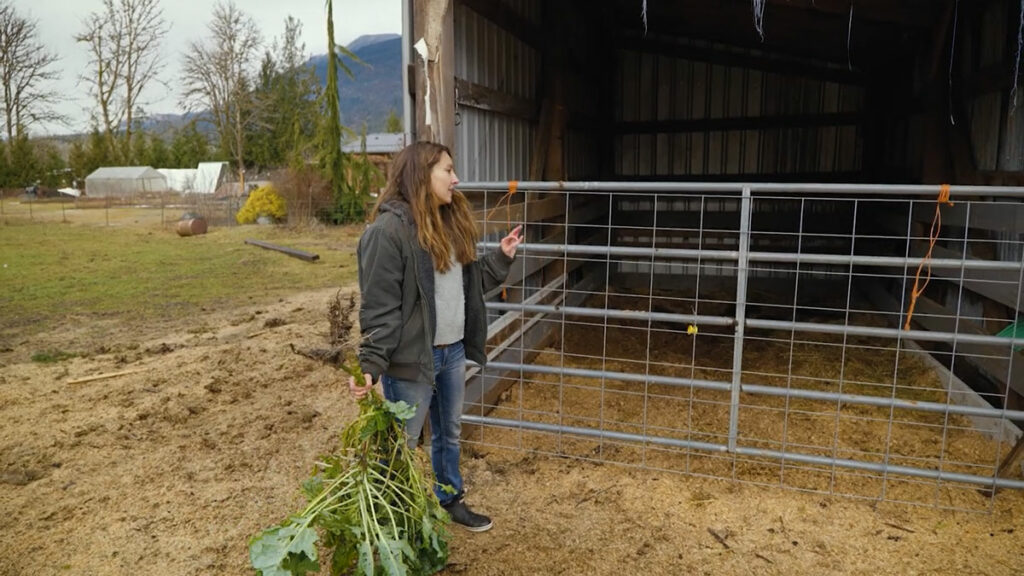
Prolonged Pregnancy & Inducing Labor
With Clover, we started getting very concerned with how much she was laying down, and we knew this wasn’t healthy for her long-term. So we called the veterinarian and asked him to come out and induce Clover.
The vet gave her a combination of Dexamethasone and Prolactin, which work together to help induce a cow. He said, usually, within 24 hours of administering these drugs, there will be a calf on the ground.
Because Clover was still laying down, he recommended we get some hip clamps and try to help her get up on her feet to avoid compartmental syndrome.
Breech Delivery
Once Clover was finally in labor, we noticed that the hoof that was coming out wasn’t a front hoof, but a back hoof. Upon inspection, we also noticed her calf was not only breech, but also upside down.
Knowing this made Clover’s difficult end of pregnancy make much more sense. But now, we knew we were going to need to assist Clover to get her calf out.
She had a little bull calf who popped up on his feet immediately and was in great health. Clover also got up on her feet right away and began eating and drinking, and the calf began nursing.
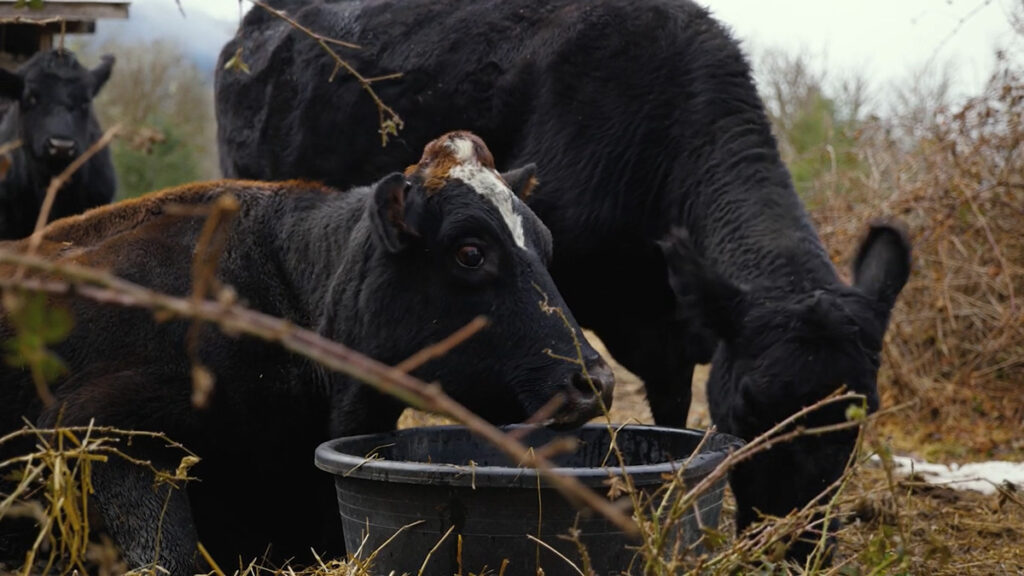
Clover’s Story
This is where the story gets tough. To hear about what transpired the last few hours of Clover’s life, listen to the podcast attached to this post.
Be forewarned that it’s very emotional as this is still extremely raw, but sometimes I think that’s what we need to know and understand. This homesteading life is tough and is filled with hard decisions.
But I wanted to share Clover’s story in hopes that someone hears it one day and it helps them through a difficult situation.
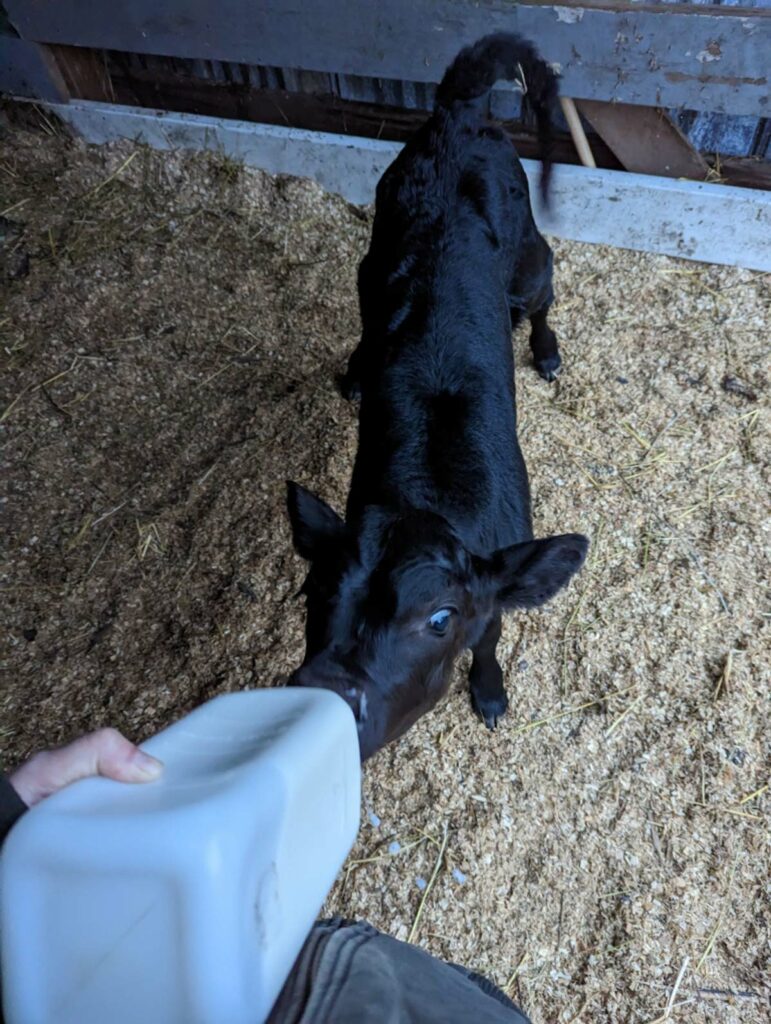
More Tips
- All cows in an enclosure need about a foot of head space around their head. This is so they have room to move around and get up from the laying position. Expecting cows especially need this because they rock back and forth a little further than normal to help get themselves up from laying down. Be sure your cow has adequate space to turn around as well (unless there is an entrance and exit on each side of the enclosure).
- As I mentioned, you can use a hip clamp if cows are lying on their stomachs but cannot get up themselves. This is a large clamp with hooks placed onto the cow’s hip and then hooked to a tractor. The tractor can then pull to help get the cow up.
- Be sure your cow has plenty of water and food at all times. Pregnancy is very taxing on animals, so we want to make sure to keep their nutrition at optimum levels.
- If you’re still unsure if all is well, you can get bloodwork done and have a full metabolic panel run. We did this for Clover the day the vet came out to induce her and it gave us great peace of mind to know we weren’t facing any underlying issues (such as milk fever or something else).
- Always have colostrum on hand because you’ll never know if you need it. You can buy it at the feed store, and it’s just a good failsafe to have “just in case.” In our case, it turned out to be a great thing we had it to keep the bull calf healthy and strong.
- Find connections with those who understand what you’re going through. If you’re looking for somewhere to do this, check out the info about the Modern Homesteading Conference below.

Modern Homesteading Conference
The Modern Homesteading Conference is a two-day event held in the Pacific Northwest. There will be both presentations and lectures from experienced homesteaders. We’ll also have tracts for those new to homesteading as well as topics for those who have been on the path longer.
You’ll bypass years of mistakes by learning from our expert speakers. Learn to create a productive homestead and find your kind of people all in the same place. If you’ve ever felt alone on this journey, you need to attend! Learn more about the Modern Homesteading Conference here.
Other Posts You May Enjoy
- 101 Everything You Need To Know – Dairy Cows
- Your Livestock Questions Answered
- Fermented Dairy
- Planning Our Farmstead Homestead
[fusebox_transcript]
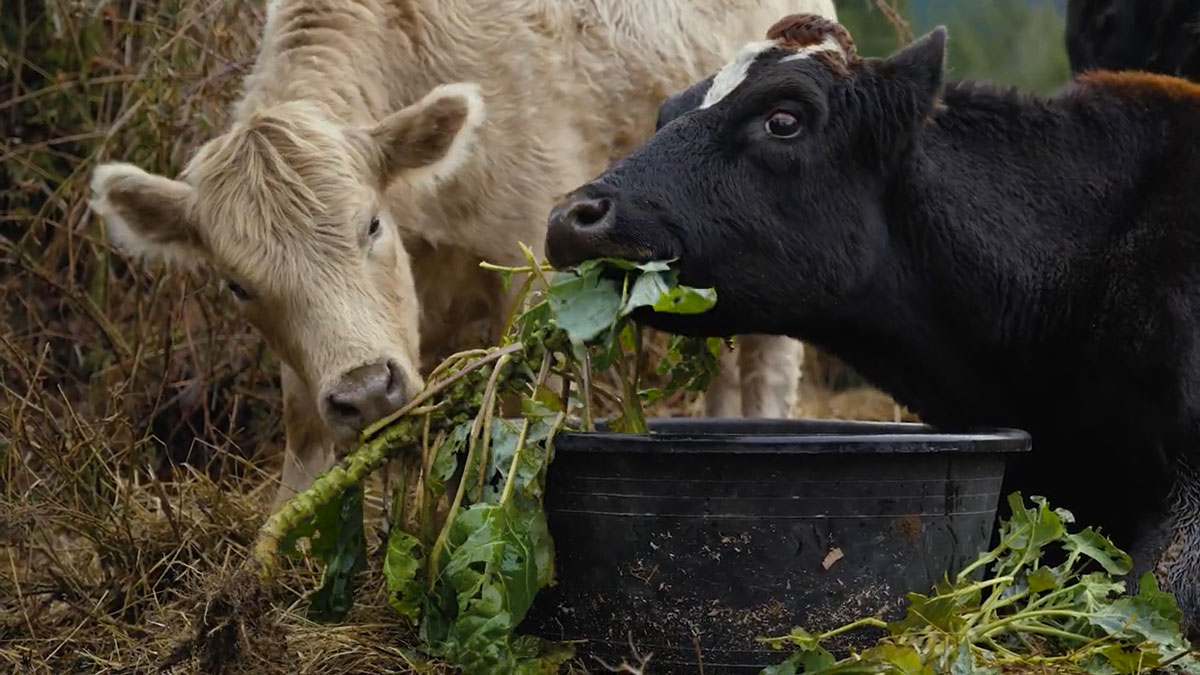
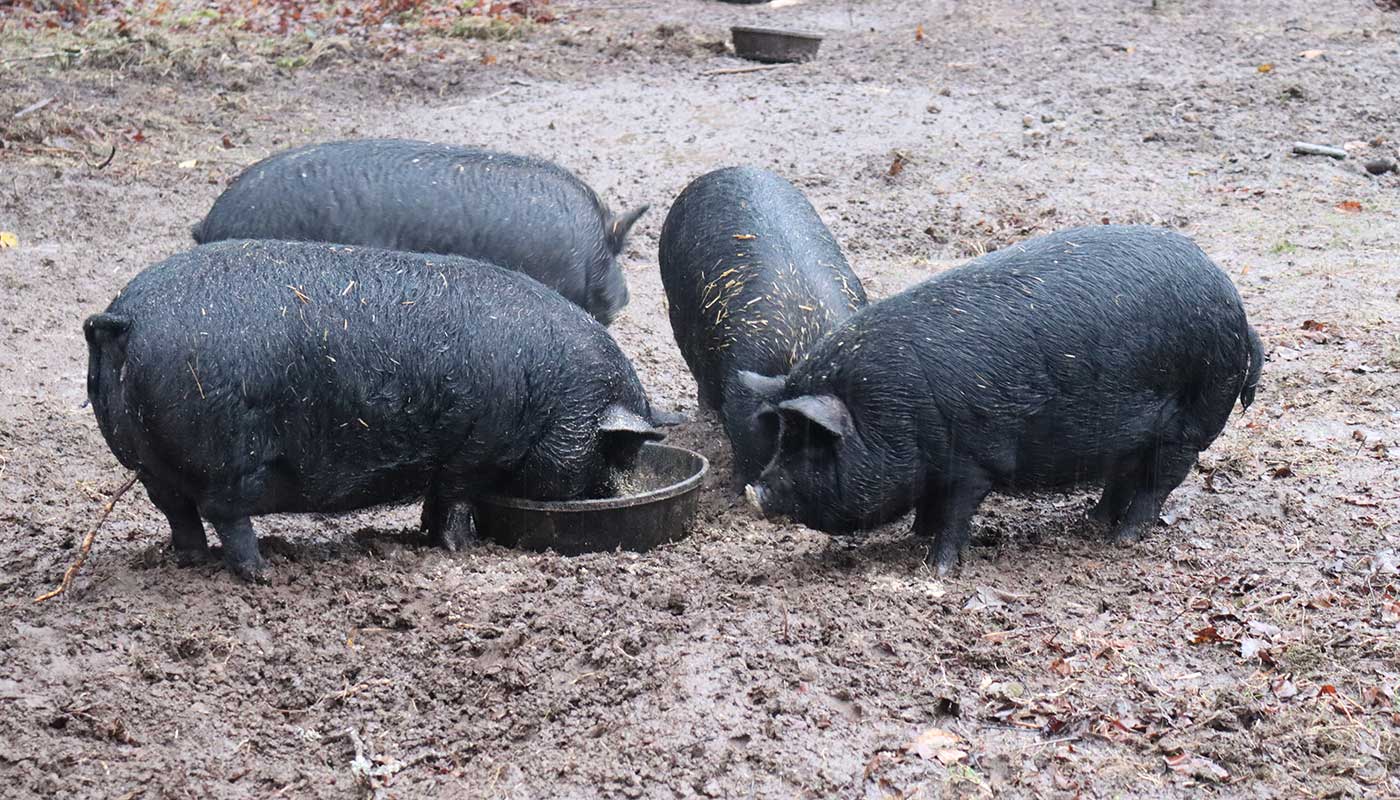
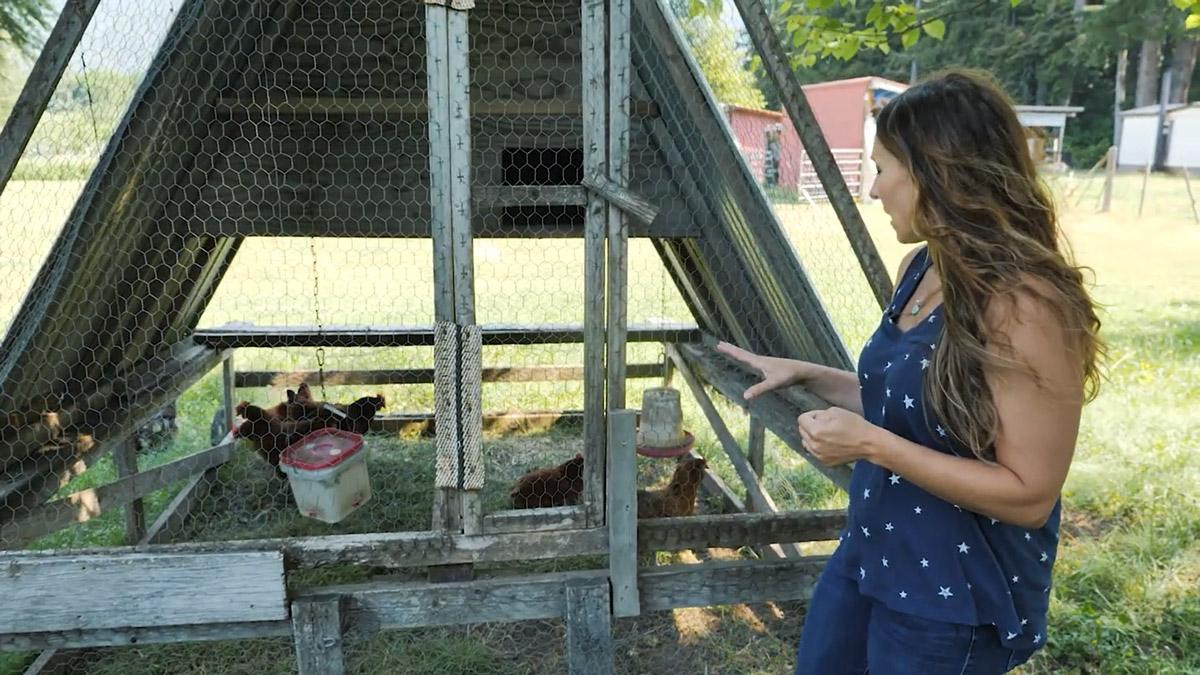
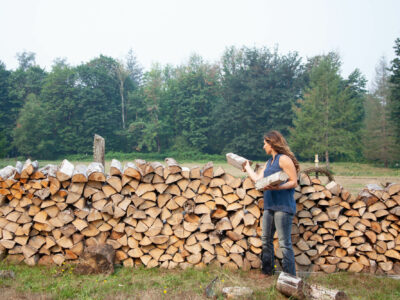
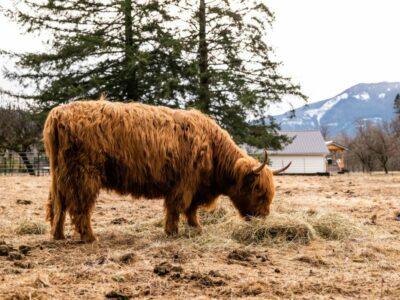
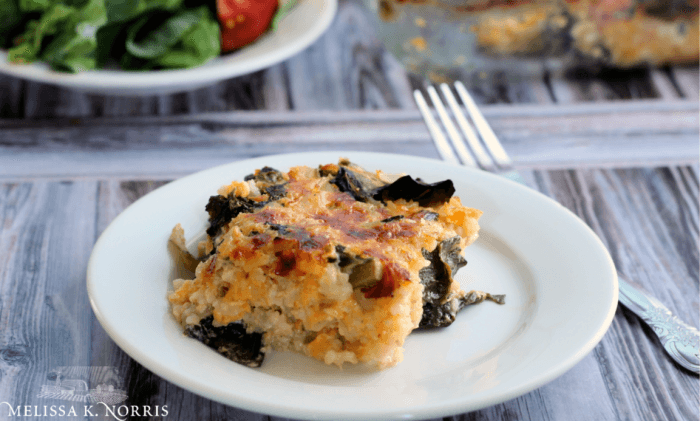
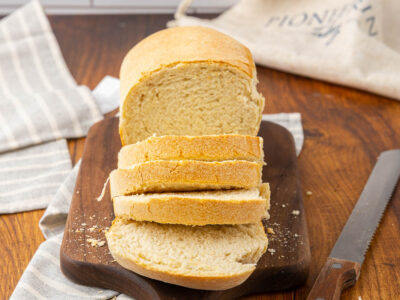
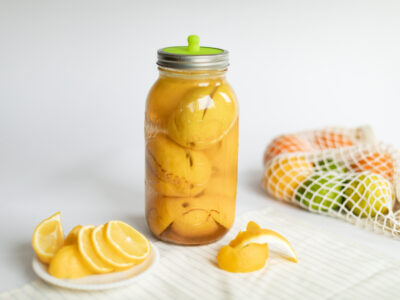
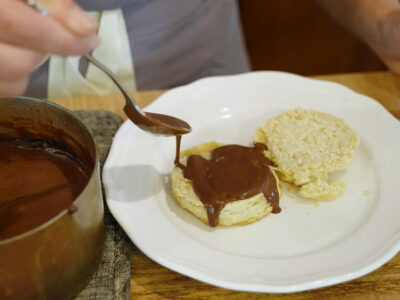
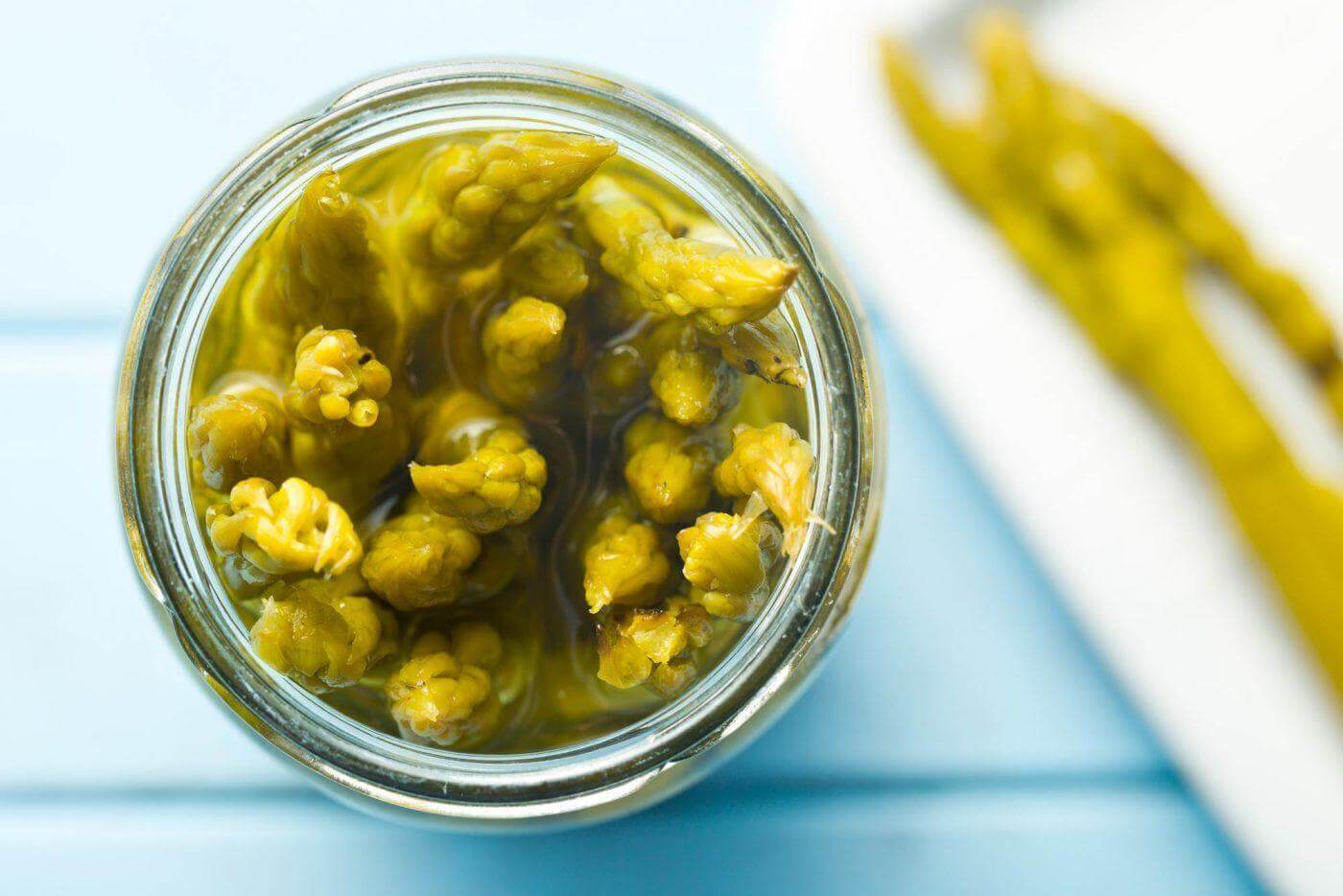
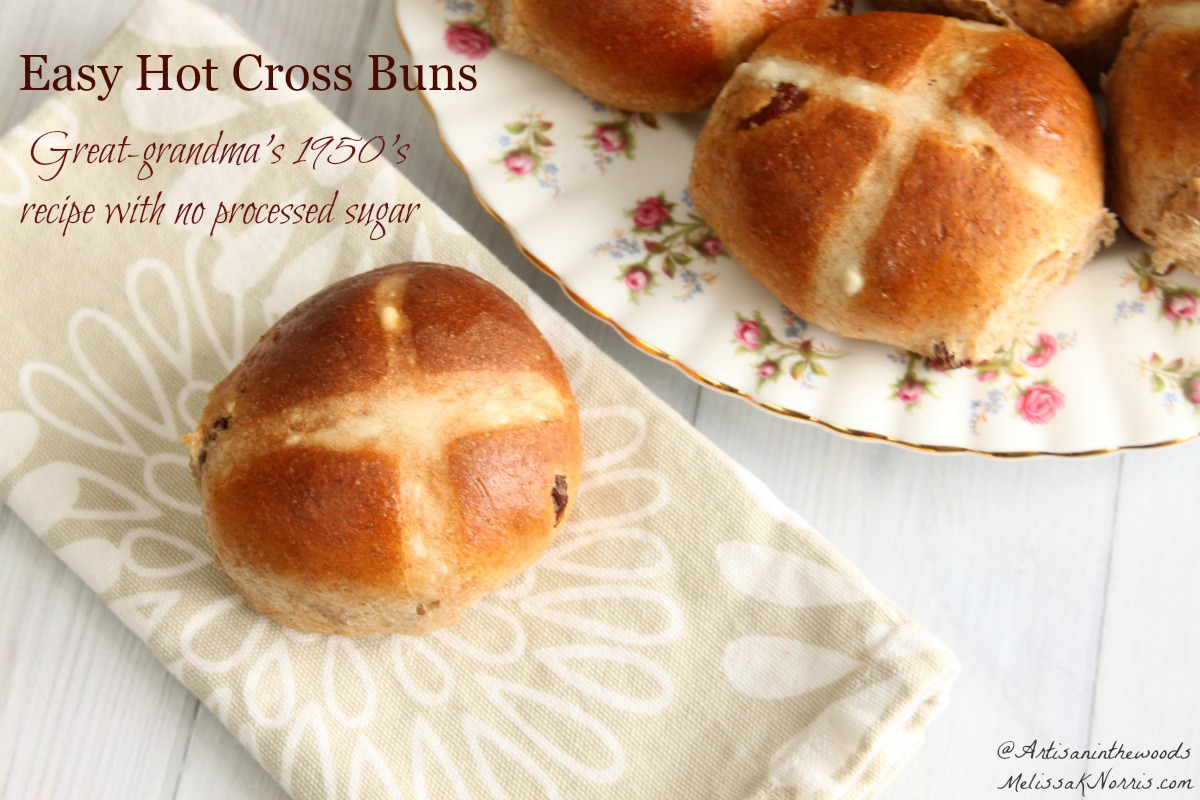
Dearest Melissa
I couldn’t listen to this before today because, after going through the joy of watching you getting Clover and your excitement, I just couldn’t.
I want you to know that it’s this – your vulnerability, your compassion, and your loving heart – that is why we love you and regularly invite you into our lives.
Continuing prayers for the strength needed to continue with sharing this journey, good and bad.
I am sorry for poor Clover and your sadness. Sweet, sweet girl. Your precious girl. She tried so hard to survive. Such spirit. Such a loving mother. She’s a great loss. And when you experience the highs and lows of trying to help her, it’s an emotional roller coaster. As I listened, I agreed with you and I thought also, it’s too bad a vet didn’t see her right off when you brought her home, before you bred her, for a baseline. I get that costs are a consideration. Might have known not to do it for her age. If it was cancer, having a baby puts a huge strain on the immune system. But, if so, there’s no way to know how long she would have had anyway. If she had some sort of bowel or urine blockage she would get sick quickly. But if he’d seen her from the get go, he might have picked up on something, too. It’s not my business, but it’s good to know things prior to doing it, pitfalls, possibilities, etc. rather than doing it by trial and error. But hindsight is almost always a good teacher. We can’t know everything, and your heart was well intentioned. You loved her. Not a thing wrong with that! We should love and care for all of them. You can’t beat yourself up. Life, because there is a devil who hates us and God, will have death and sadness. Her creator cares about what she went through, and that she died. I’m thankful you were able to put her to sleep so she didn’t suffer longer. It’s a blessing the vet came out and she didn’t lay there all night suffering. If they aren’t going to get better and they are almost done,(animals NOT humans), you did the right thing.
Now, as for the person who didn’t understand why someone would not eat their cow, it was, to me, a bit of a calloused question. Poorly timed. I guess when you open your life up to the public, you get stuff like that. It’s not easy. Sorry. My first thought was WHY would you ask that! Clover is basically a pet. To me, they all are. You just don’t eat pets. I would love to have a huge spread and buy up a bunch of poor creatures that are destined to be slaughtered, and give them a home where they could graze peacefully and live free. I’ve been to a slaughter house. Everyone should go to one. This stuff doesn’t just magically appear on a slab of stryrofoam. Those poor creatures. They smell fear, they hear the cries of their companions, they try to avoid their fate. Fear hormones are released into their bodies, which affect their meat. I watched one cow rear up trying to get away and she slipped and fell on the concrete. Horrific. It broke my heart. Still does. I’m hearing that now poor animals are shipped to china to be slaughtered the way they do things, and then brought back here to pass off to people here. Those poor, poor animals.
In addition, you have no idea what Clover had and YOU CAN GET DISEASE FROM DISEASED ANIMALS. Cancer is transmissible. I know someone who cut into a piece of chicken on a plane meal and the pus pocket squirted all over. It’s not like cutting a bad spot out of an apple as some think, and the usda inspectors used to, at least, accept that as adequate. There are lymph glands, blood stream, etc. which transports disease through the body. Eating blood is UNHEALTHY. God says not to eat it. For good reason. Also, it’s the urine in the meat that makes it smell good when it’s cooking. Urea is in the blood. It’s meant to purify. Why would people eat impurities. And the LIVER, there’s a whole lot to be said about that! God created us, our bodies, animal and human, to function in wonderful ways, and to carry waste out of our bodies. There’s just too much. It’s why I’m a vegetarian. for almost 50 years now. For the health aspects. Why get my nutrients second hand by eating an animal? There is protein in everything. You balance them, grains with legumes, etc. People live longer on a vegetarian diet. There are studies. For a cell to exist it has protein as one of its components. But mainly I love animals and couldn’t eat them. Nothing with a face. Something that feels pain. I won’t. Eating lobster, etc. is so cruel where they boil them alive. And you are right, the older we get, the more compassionate or tender hearted we get and things hurt more. It’s getting harder and harder for me to put an animal to sleep, to know when. We have such hopes they will survive and come out of it. We’ve lived enough, experienced enough, to have seen miracles where they do. It’s not a light decision. I hear your loving heart, and pain, and I’m so sorry. It’s so good she got to eat yummy things, enjoy the good stuff before she wasn’t able to. That you cared for her enough to do that, thank you. God is good. We are hardest on ourselves. In the earth made new there will be no more pain or suffering, no disease. Take heart and daily study Him and find joy in His blessings.
Thank you so much for sharing your beautiful story with us all. I am literally out walking my dog on this beautiful day, sobbing. You made me cry because although I have never had a dairy cow I do know what it’s like to lose livestock and if you if I get that upset over losing a chicken, I cannot even imagine what it is like to lose what you have lost. Thoughts and prayers are with you and may all that you have learned assist you later on on your next experience with your next dairy cow. I hope each day gets a little easier for you.
Thank you, Melissa, for sharing your experience and your love of Clover. I have always wanted a dairy cow. Your story has only made me want one even more and I thank you for sharing your experience so I will be the best cow mama I can be. From me and mine to you and yours, our sincere condolences on your loss. You honored Clover as you should have, don’t ever second guess that.
Dear Melissa,
Thank you for sharing this heart wrenching experience of losing your precious cow, Clover. I have followed you for several years now, and appreciate all of your wisdom and experience that has helped us in our homesteading journey. I can empathize with the loss that you feel as every animal we have lost on our little farm has produced a time of mourning and reflection upon the fallen world we live in. Yet, there’s hope for those of us who trust in our wonderful Creator who understands our grief & sadness better than we can imagine. Thank you again for your encouragement & I hope our paths will cross someday soon as we continue to learn & grow our little farm by the grace of God. May He continue to sustain you & bring you much healing.
Blessings,
Clair Watson
Beef cattle can occasionally get milk fever as well. I didn’t know that until we had one that did. She was a registered Angus cow two days past parturition. She ended up in the creek upside down with just her nose above water. By the time we were able to get her out of the creek, she was hypothermic. Our vet came out and gave her as much calcium as was safe. It took her several hours to be able to get up. Long story short, she went down again and was down for a week often flopping over on her side unable to stay on her sternum. It took a lot of work (and prayers), but in a week’s time we managed to get her on her feet and she made a full recovery.
I should have added that I can relate in part to the heartache you experienced and my heart goes out to you. We have had some tragedies with our livestock and when you emotionally invest yourself, it is just so painful to lose them in spite of your best efforts. There have been times that I have considered not having cattle because of this very thing. I think that if you have them long enough, you see and experience things that you would just rather not, and it leaves a mark. Listening to your story brought back a flood of memories and emotions. At least you know that you did your very best for Clover.
Melissa, I’m so deeply sorry for your loss and I appreciate it that you decided to share Clover’s story with everyone. I sobbed and cried with you because I know what it’s like to lose a beloved pet. I understand she wasn’t a pet, but the bond you shared was very similar to what we have with our pets. It is incredibly hard when they go especially when it happens unexpectedly, when we think we were going to have more time with them. No need to apologize for being a human being. The rawness of this podcast is one of the things that makes it beautiful. Thank you for being an amazing human and sharing your light with everyone!
You don’t need to apologize for loving and caring for Clover. It’s ok to grieve her loss. Your love and compassion for your animals as a homesteader, that you’re not all business, is admirable. I am not a homesteaders but like to think if I were much younger with all the resources available now that I could have been. Thank you for being open and honest. Prayers for you and your family as you grieve the loss of Clover and tend to her calf.
As I listened to this podcast it brought back such sadness for me. This past summer we lost our family milk cow (Ruthie) suddenly. It broke me my heart! Ruthie was an older jersey milk cow we got from a dairy farm. She had her calf (Luke) and she passed a short time after he was born. I buried her in our field. I could of NEVER eaten her so I completely understand how you feel. I would always say Ruthie was my spirit cow.? God blessed our family with Ruthie and he blessed you with Clover. I know how hard this is for you and I will pray for you!??❤️
Bless you, dear one. I so respect the work that you do and how honest you always are in your sharing. Praying for you.
I have always appreciated you as a homesteading mentor, but your podcast has elevated that to a feeling closer to that of sisterhood…GOD BLESS YOUR GENTLE HEART!! I sobbed and screamed and sobbed and cried when my favorite doeling died by accident (avoidable strangulation on hay twine that I had looped on the perimeter fence…and again when my prettiest doeling died because we couldn’t pull the baby. It doesn’t get easier to lose a member of our homestead Family…i wish that it did…but then again, we’d lose the heart that we use to nurture our beloved babies. Nowadays, I make it my mission to make sure that those who choose to leave are kept dry and warm and comfortable until their time comes…and that I let them know that their « Moogie » loves them and is so very proud of them and that I am grateful that they chose to spend their precious time here with us. That mindset has helped ease the pain of their passing. Clover was so very blessed to have found you and bonded with you and enjoyed the home that you gave her…without your love and kindness she would never have known those feelings while she was here on Earth…BLESSINGS to you Melissa…you are one of Great Spirits most beautiful stewards!
Melissa it doesn’t matter if clover was a cow or any other animal she was like a person when we get attached to them that’s just way us farm girls feel, we love protect feed and take care of them with our whole heart doesn’t matter what animal it is that’s just part of being on the farm and you did a wonderful job. Prayers to you and your family.
Oh Sissy! I cried throw this whole video! So sorry you lost clover! Sounds like she fought a good fight! Your sister cries when she looses a baby chick!
Big Hugs! Love You!❤️?❤️?
Please don’t blame yourself for breeding your cow as the reason she died. If it was cancer, she was going to pass, pregnant or not.
You are too caring a person to not do everything in your power to keep your animals cared for properly. I especially want to commend you on your choice to bury her on your farm. She was always intended to be a long term member of your family, not a short term commodity.
I’m am so sorry for your loss of Clover. I am listening to your pod cast and crying with you. I can’t imagine how hard it was to share your heartbreaking story of Clover but I am grateful for the information that you have shared. Prayers and positive healing energy to you and your family.
Clover was truly loved and she will shine through as she nourishes all the plants above her in the pasture; her final resting place.
What a beautiful, touching story of heroism and loss. I admire your journey of learning, growing, reaching, tending, loving and compassion. Your story will heal and help many who are on a similar journey in life. Thank you. You are truly a gift to all of us who follow your life.
I was crying the whole way through your story as someone who only got my first dairy cow a few years ago I completely understand what you’re saying. House dairy cows are different you become attached to them you spend lots of time with them up close and personal as you milk them. You talk to them every morning as goi milk them and they are different to any other animal you have on the homestead and they become imprinted onto your heart. While I care for every one of my animals the love I have for my dairy cows is different they are just such special animals. Unless you have experienced this it’s hard to understand I would have never understood it prior to having my girls. Melissa I’m so sorry for your loss you and don’t ever think you are a bad homesteader for being upset over Clover and like you when my girls get older they will retire on my property and they will be buried on my property. Thank you for sharing this difficult story and I hope it’s getting easier for you ?
Melissa, I’m am sorry to hear of your loss. I was crying as you told us about Clover and my heart is hurting with you. Animals have a way of getting into our hearts and when we lose one the hurt and pain is real. Never feel bad for crying over an the lost of one. May you feel God’s love and His presence with you during this time. God bless and thank you for sharing your life with us.
I’m so sorry for your loss of Clover. It sounds like you did everything you possibly could have. Sometimes, no matter what, we are not able to save them.
I am a mobile end of life veterinarian but I only deal with cats and dogs. But, I understand the depth of emotion we feel for an animal we care for, especially those that we have such a close association with twice daily. I even found myself tearing up as you relayed your story and I could feel your raw emotions. She wasn’t just a cow, she was your milk cow, your Clover. You shouldn’t be embarrassed about crying and feeling so bad. Good people feel things deeply and there’s nothing wrong with allowing yourself yo make that connection. However, as you know, you can’t bond with all of your homestead animals or you couldn’t survive emotionally .
I believe you did what you needed to do and now she can be there in your back pasture forever. Hugs to you ?.
So sorry that you lost Clover! My heart goes out to you. You used this situation to speak life and truth. God bless you!!
Aw, Clover. Made me tear up. Not everyone has the same capacity to love animals. You did everything you could. Forward ever, backward never. Continue to keep up this good work. Reminds me of my little Ivy. I only had her for five months and it was harder when she passed then dogs I had for years. You’ll never forget Clover.
I feel your pain. This walk isn’t easy but it is rewarding. Without the bad we can’t fully appreciate the good. Can’t hardly wait to go home! But while we are here we do he best we can. I had a friend who I prayed out of this world and her favorite phrase was “Thank God for God!” Prayers go with this note for you, Hon. In His love, Marilyn
I’m so sorry for your lost. Clover gave you one last gift, a beautiful baby boy. I’m thankful that you shared your story with us. As I’m interested in getting a dairy cow it opened my eyes to things I had t even thought of yet. I pray that your family have peace through all of this.
Just finished your podcast about Clover. I’m so very sorry for your loss. I don’t think your being heartbroken about a cow is silly. The World needs more people like you. Try not to be so hard on yourself, Clover was living her Best Life with you. You provided that for her.
You are my kind of People. Take care and God Bless You and Clover.
I am so sorry you lost Clover. Being upset over it does not make you a bad homesteader, it just means you are human and care. I cried along with you during the podcast. You are not alone. We all love you!
I cried while you were talking about Clover and your experience with her. I don’t have a homestead or a garden or chickens or anything homestead. I just keep wishing I did and I listen as much I can to learn and hope that one day my husband will be on board. She was a very special cow and I’m sorry that she passed. God who is our comforter and strength grant you both. God bless❤️
So very sad to hear about Clover. I have had to deal with milk cows and difficult births. Lost calves in the process fortunately not many (Twins Locked and died before we could get them out). We have a serious lack of Lg Animal vet here which is harder but we have a community of experienced homesteaders with knowledge that we can call on for help
I have put my milk cow into retirement, I have had her since she was 9 Mo old she is 14 years now. And I am not sure I could butcher her as she has been a wonderful producer in the past and i still enjoy her being on the ranch. I honor her service during her productive years.
As for as why not eating her. We do not eat our friends. I wonder if the commenter who thought it was a waste of meat should consider if they would eat their dog.
Also not knowing the exact cause of her illness and her body condition, it would be folly to consume the meat.
I do hope to meet up with you in person at the conference in CDA this summer.
I fully understand your sorrow. I have been there and it is not fun.
T.K.C.
I am so sorry for you for Clover’s departure. Thank you for sharing your tips on caring for a milk cow. We do not have livestock but found it most interesting. God Bless.
Life is so full of ups and downs and so often we only talk about the joys and finished products of homesteading and not the hard that often happens all along the way. Thank you for sharing the hard. I’m so sorry to hear about Clover. I know from the way you talked about her that she was special. Looking forward to getting to watch Rebel grow!
I am so very sorry for your loss! I am still looking for my first milk cow and I can easily imagine how devastated you must feel!
Ohhh, I’m so sorry to hear that Clover passed away. I just finished the video and came here for more info. How is the calf doing? Will you still make a follow up video, or just the podcast? Thank you for sharing all of this. It’s extremely helpful!
I’m sorry to hear about Clover, I’m here in eastern Washington and have often thought about getting a dairy cow, we have a little over 2 acres, have too many other projects going on right now, hope your call grows to be healthy and strong, God Bless!